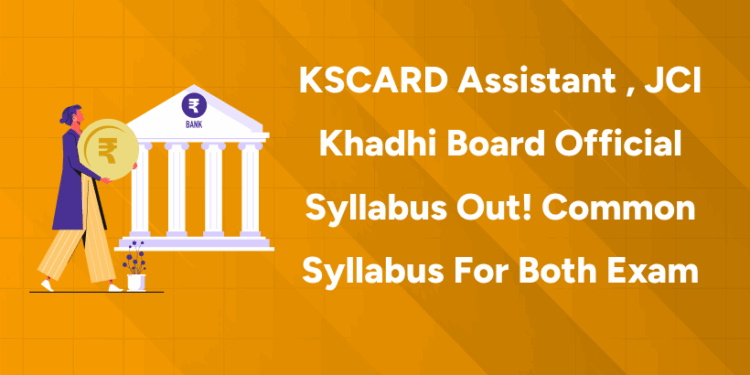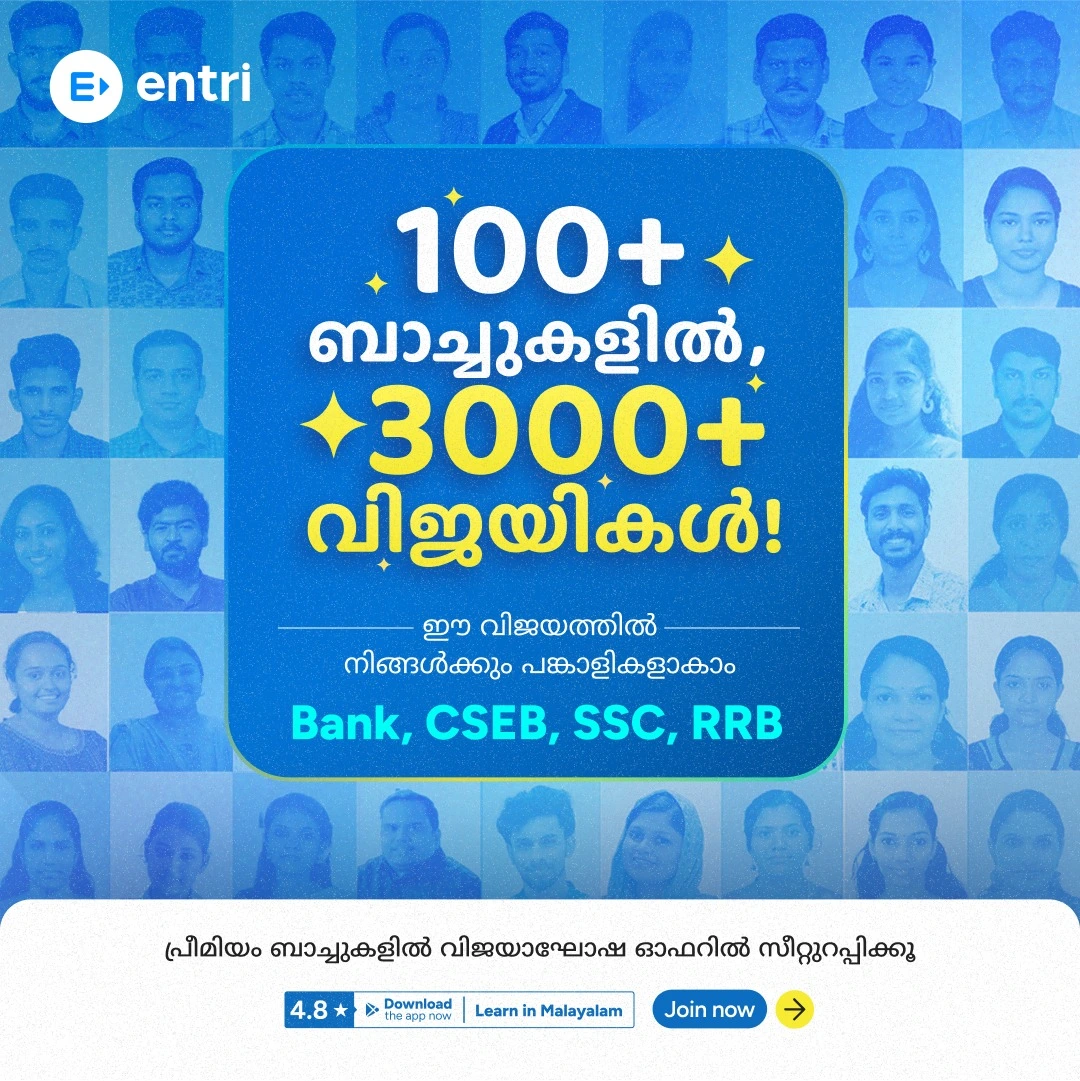Table of Contents
The Kerala Public Service Commission has officially released the common syllabus for the KSCARD Bank Assistant and Junior Co-operative Inspector (Khadi Board) examinations. This year, the PSC has also announced that the written exam will be held on 28 February 2026, and the date is fixed without any possibility of postponement. With this announcement, aspirants now have a clear timeline and an exact syllabus to begin structured preparation.
Both exams are great opportunities for candidates looking to secure a stable, well-paying government role in Kerala’s co-operative and rural development sectors. Since the selection process is competitive and entirely merit-based, understanding the syllabus, exam pattern, and topic distribution is crucial for effective preparation. The common syllabus makes it even easier—candidates preparing for one exam can simultaneously prepare for the other without extra effort.
This blog provides the complete syllabus, exam pattern, and a detailed breakdown of every topic to guide you in creating a strong, focused study plan.
Prepare strategically for the Bank exam! Get Free Demo Classes Here!
KSCARD Assistant , JCI Khadhi Board Official Syllabus 2026: Exam Pattern
The exam follows a single written test for 100 marks, divided into three major parts:
| Subject | Marks |
|---|---|
| Part I – Co-operation | 50 |
| Part II – Banking | 40 |
| Part III – IT & Cyber Laws | 10 |
| Total | 100 |
The test is expected to be objective OMR-based, and the syllabus level corresponds to the prescribed educational qualification. Since both KSCARD and Khadi Board positions require strong conceptual clarity in Co-operation and Banking, candidates must approach these sections with deep understanding rather than surface-level memorisation.
KSCARD Assistant , JCI Khadhi Board Official Syllabus 2026
1: What does the acronym "ATM" stand for in banking?
(Common for KSCARD Assistant & JCI Khadi Board Junior Co-operative Inspector)
Below is the complete, expanded explanation of all topics mentioned in the official PSC syllabus. Each section includes multiple paragraphs to make concepts easier to understand and prioritize while studying.
PART I – CO-OPERATION (50 Marks)
1. Co-operation & Economic Systems
This section explores how co-operatives fit within the broader spectrum of economic systems like capitalism, socialism, and communism. Understanding these ideologies helps candidates compare how ownership, profit distribution, and decision-making differ between each system.
It also explains why co-operatives stand apart from partnership firms, joint-stock companies, and private enterprises. The syllabus stresses the dual nature of co-operatives as both institutions serving people and enterprises operating in the market.
Candidates must know what a “co-operative commonwealth” means and how it contributes to inclusive economic growth.
2. Evolution of Cooperative Principles
This topic traces the historical growth of co-operative values, beginning with the Rochdale Pioneers, who laid the first modern co-operative principles. The syllabus further covers the modified ICA principles of later years and the Karve Committee’s contributions in India.
Understanding the difference between co-operative values (ethics) and co-operative principles (operational guidelines) is essential. These principles shape how co-operatives function democratically, maintain transparency, and ensure equal benefit for members.
3. Types of Cooperatives in India & Kerala
This is one of the largest sections. It describes every major type of co-operative institution, including Primary Agricultural Credit Societies (PACS), Urban Co-operative Banks, State Co-operative Banks, and long-term credit structures like PCARDBs and SCARDBs.
You will also study marketing societies such as NAFED, rubber, fishery, dairy, consumer, industrial, and housing co-operatives. Each of these institutions plays a key developmental role in Kerala’s local economy.
Special focus is also given to workers’ co-operatives, which are unique to Kerala and crucial for rural employment generation.
4. Management of Major Cooperative Institutions
This section covers national-level organizations such as IFFCO, KRIBCO, NAFED, NABARD, NDDB, and NCDC. Understanding their management structure, purpose, and support to co-operatives is important.
These organizations provide financial aid, training, technological support, and policy guidance to co-operatives across India. Candidates should understand how institutions like NABARD support rural credit and how NDDB modernizes dairy co-operatives.
5. Cooperative Audit
Co-operative audit is a core governance function. The syllabus covers definitions, objectives, and scope of auditing within co-operatives. Unlike audits of private companies, co-operative audits emphasise member-interest and democratic accountability.
Students must study different audit types—mechanical audit, administrative audit, and statutory audit. The process of preparing final statements, classifying audits, and reconciling bank accounts is also important.
Knowledge of audit fees, auditor responsibilities, and legal powers is essential.
6. Issues in Cooperative Management
This part describes the typical challenges inside co-operatives, especially in managing member participation, conflicts, competition, and collaboration.
The syllabus explains differences between small-area and large-area co-operatives, single-purpose versus multi-purpose societies, and federation structures. Understanding financing challenges and evaluation frameworks (member, enterprise, ethical dimensions) is crucial.
7. Dispute Settlement
Candidates must understand arbitration procedures, awards, execution processes, and appeals. This includes knowing the role and constitution of Co-operative Tribunals, which handle disputes related to co-operative institutions.
Review and revision mechanisms and offence-related provisions also form part of this topic.
8. Sources of Funds
Co-operatives receive funding from share capital, state aid, loans, grants, and partnership funds.
This section explains the difference between owned and borrowed funds and how each impacts co-operative functioning. Knowledge of principal and subsidiary state partnership funds is essential.
9. Cooperative Legislation
This section explores the evolution of laws governing co-operatives in India, starting from the Co-operative Credit Societies Act of 1904 to the Multi-State Co-operative Societies Act of 2002.
You will also study the Kerala Co-operative Societies Act, 1969, which is the backbone of co-operative operations in Kerala.
PART II – BANKING (40 Marks)
1. Commercial Banking
This section teaches the foundations of commercial banking, including types of banks such as unit, branch, correspondent, chain, and mixed banking systems.
It explains the primary and secondary functions of banks, types of deposits, and various lending methods. Concepts such as CASA, BSBDA, overdraft, bill discounting, and credit creation are crucial for examination.
Candidates must clearly understand how commercial banks mobilize funds and support the economy.
2. Central Banking & RBI
This is one of the most important topics in the Banking section. It covers the role of the RBI in issuing currency, managing government accounts, supervising banks, and regulating monetary policy.
Students must understand quantitative and qualitative credit control measures like CRR, SLR, OMO, bank rate policy, moral suasion, and margin requirements.
Knowledge of foreign exchange reserves, the developmental role of RBI, and financial stability mechanisms is also essential.
3. Indian Banking – Pre-Liberalisation
This part focuses on the history of banking in India, including the formation of the Imperial Bank, creation of SBI, and nationalisation of major banks.
You will also study the Lead Bank Scheme, Service Area Approach, and Regional Rural Banks—institutions that support agricultural and rural development.
4. Indian Banking – Post-Liberalisation
This section explains how the banking sector evolved after 1991.
Topics include recommendations of the Narasimham Committees, emergence of private-sector banks, mergers, Small Finance Banks, Payment Banks, and financial inclusion initiatives such as Jan Dhan Yojana and mobile banking.
5. Banking Regulation Act, 1949
Every serious banking exam aspirant must understand the fundamentals of this Act.
It covers definitions, permitted/prohibited activities, voting rights, reserve funds, licensing, inspection, audit provisions, and rules related to merging and winding up banks.
6. Practices of Banking
This part discusses banker–customer relationships, rights, duties, cheque operations, secrecy of customer accounts, garnishee orders, and wrongful dishonour.
It also covers account operations for joint accounts, firms, NRIs, companies, clubs, and societies.
7. Negotiable Instruments
This includes promissory notes, bills of exchange, and cheques. Students must understand endorsement types, crossing, marking, and the roles of paying and collecting bankers.
8. Agricultural & Micro Finance
A core area for rural-oriented exams.
Topics include agricultural loans (short/medium/long-term), crop loans, Kisan Credit Card, priority-sector lending, SHG–bank linkage, and NABARD’s key functions.
9. Technology in Banking
Modern banking uses technologies such as NEFT, RTGS, IMPS, ECS, ATMs, IFSC, digital wallets, mobile banking, and CTS.
Candidates must understand the basics and practical usage of these systems.
10. Recent Trends
This topic includes CAMELS rating, capital adequacy, NPA classification, SARFAESI Act, securitisation, and major social security schemes offered through banks.
Prepare strategically for the Bank exam! Get Free Demo Classes Here!
PART III – IT & CYBER LAWS (10 Marks)
This section tests basic computer awareness.
It covers input/output devices, memory types, system software, application software, and operating systems.
Candidates must also know basic functions of word processors, spreadsheets, and presentation tools.
Networking topics include LAN, WAN, MAN, and devices like routers, hubs, bridges, and gateways.
Internet basics, HTML understanding, and cybercrime categories under the IT Act are also part of the syllabus.
Enroll in Kerala's Top-rated Bank Coaching Program!
Are you ready to take your banking career aspirations to new heights? Join Entri App's Bank Exam Coaching program to kickstart your preparations!
Join Now!Download Syllabus PDF & Notifications
Below are the official syllabus PDF downloads. These documents contain the authentic syllabus exactly as issued by the Kerala PSC for KSCARD Assistant and JCI Khadi Board examinations.
Download Common Syllabus PDF (100 Marks Exam)
This PDF contains the complete Co-operation, Banking, and IT syllabus prescribed for both exams.
Download KSCARD Bank Assistant Notification
This notification includes eligibility, age limit, reservation rules, application instructions, and recruitment details.
KSCARD BANK ASSISTANT NOTIFICATION 2025
Download JCI Khadi Board Junior Co-operative Inspector Notification
This link contains official recruitment details, qualifications, probation terms, and application guidelines for the Khadi Board post.
KHADI BOARD JCI NOTIFICATION 2025
Final Note
With the exam date fixed as 28 February 2026, candidates now have a clear and focused preparation window. Begin early, revise consistently, and follow the syllabus structure provided above. Since both exams share the same syllabus, your preparation will be twice as efficient and much more impactful.
Enroll in Kerala's Top-rated Bank Coaching Program!
Are you ready to take your banking career aspirations to new heights? Join Entri App's Bank Exam Coaching program to kickstart your preparations!
Join Now!Frequently Asked Questions
What is the exam date for the KSCARD Assistant and JCI Khadhi Board exams?
The Kerala PSC has officially confirmed that the written exam for both KSCARD Assistant and JCI Khadhi Board Junior Co-operative Inspector posts will be conducted on 28 February 2026. The date is fixed and will not be postponed. Candidates should plan their preparation timeline based on this confirmed schedule.
Do both exams follow the same syllabus?
Yes, both exams follow a common 100-mark syllabus covering Co-operation, Banking, and IT & Cyber Laws. This shared structure allows candidates to prepare once and apply the same knowledge to both exams. The official syllabus is provided through the common PSC document released for these posts.
What qualifications are required for applying to these posts?
For KSCARD Assistant, candidates need a degree with JDC/HDC or B.Com with Co-operation or B.Sc (Co-operation & Banking). For the JCI Khadhi Board post, applicants must have B.Com with Co-operation or a degree with HDC/JDC. These qualifications ensure candidates possess essential knowledge in co-operative principles and related areas.












